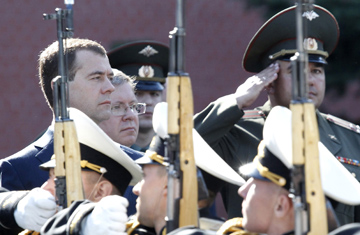
Russian President Medvedev attends a wreath laying ceremony at the Tomb of the Unknown Soldier in Moscow
(2 of 2)
Natalya Sirmanova says her nephew, Private Yevgeny Filippov, had little reason to kill himself. Filippov was two weeks from finishing his mandatory service when he hanged himself from a bunk bed at his military unit outside Moscow in June 2007. The following year, a military judge found an older officer, Konstantin Roslov, guilty of assaulting the private for refusing to bring him a bottle of beer and thus prompting him to take his own life. Roslov was sentenced to five years in prison. "We visited [Filippov] a month before he died," Sirmanova says. "He said he was ready to get on with his life. He told his mom that he would be out soon." Doctors hired by A Mother's Right examined Filippov's case and concluded there was significant evidence that he died from beatings incurred before his alleged suicide.
According to Russian Defense Ministry statistics, of the 297 noncombat deaths from January through November last year, just four were officially attributed to hazing. When questioned about this by the government daily Rossiiskaya Gazeta, chief Russian military prosecutor Sergei Fridinsky said the low number of suicides linked to dedovshchina did not signal a cover-up. "Every single incident of suicide is investigated," he said in October 2009. "If it leads to the conclusion that a person committed suicide due to hazing, then the guilty parties will be convicted and the tragedy will be classified under hazing statistics. But people take their own lives for different reasons."
Russian military investigators say they are looking into whether mental or physical abuse may have prompted Suslov to hang himself. Svetlana Petrenko, a spokeswoman for the main investigative committee of the Russian Prosecutor General's Office, declined to comment on Suslov's case and referred TIME to official statements released to the media.
Russians have become so familiar with stories of military suicides that Suslov's death might have warranted little more than a brief mention in the press had it not been for the disturbing video posted on YouTube on June 2 showing his body in an open casket. In the video, Suslov's shirt is opened to reveal a line of enormous stitches running from his neck to his abdomen, evoking images of the leather laces on an antique basketball. His mother hovers over his body while the mother of a solider who allegedly committed suicide in 2003 gives a harrowing narration of the apparent injuries to Suslov's body. The woman, Alma Bukharbayeva, claims her son Marat was murdered during his mandatory service in Bikin and that his organs were removed and sold on the black market in China. The crude stitches and various bruises and abrasions on Suslov's body, she alleges in the video, indicate his organs may also have been removed to be sold for transplant surgeries.
At a June 18 news conference, Fridinsky categorically denied the existence of a "mafia that removes organs right there in the train and sends them somewhere," and transplant specialists dismiss the claims as well. The preparation, expertise and time constraints involved in the removal of organs for transplantation exclude the possibility of such a complicated procedure taking place on a train full of soldiers and civilians chugging across Siberia, Andrei Vatazin, a veteran Moscow transplant specialist, tells TIME.
But sometimes despair trumps logic. Tatyana Suslova says she believes her son was probably murdered for his organs and that she's ready to have his body exhumed to prove it. "I won't stop until I discover the truth," she says.
